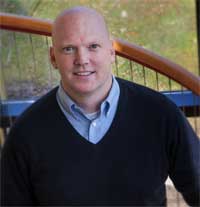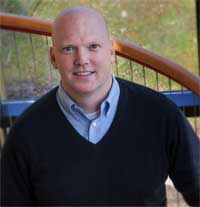 KINGSTON, Dec. 5, 2012 – New Year’s resolutions are easy to make and, unfortunately, easy to break. Who among us hasn’t committed to a healthy diet at the stroke of midnight on January 1, only to devour a bag of salty chips a few days later.
KINGSTON, Dec. 5, 2012 – New Year’s resolutions are easy to make and, unfortunately, easy to break. Who among us hasn’t committed to a healthy diet at the stroke of midnight on January 1, only to devour a bag of salty chips a few days later.
The good news is that there are steps you can take to help you stick to your resolutions and achieve your goals, says Bryan Blissmer, a University of Rhode Island kinesiology professor and an expert on how to treat unhealthy behaviors, with a focus on exercise.
“People often create resolutions regarding their health, ranging from losing weight and eating right to quitting smoking and starting an exercise program,” he says. “Regardless of what behavior you’re trying to change, we’ve found common factors that help predict success.”
A willingness to make a change is the first step, one that many people are not ready to do. But that resolution should be specific. Steer clear of goals that are nebulous or too broad: “I want to eat better.” A better goal is, “Eat five fruits and vegetables every day.”
Goals should also be realistic, Blissmer says. “The old adage of shooting for the moon doesn’t work in this case because you might run out of fuel and motivation and come crashing back down to earth,” he says. “Setting small and short-term goals gives you an opportunity to be successful and evaluate how the change is working for you.”
In other words, come up with an attainable goal for the year, but break it down into manageable steps throughout the upcoming weeks and months.
The next step is creating an action plan that articulates how to reach those goals. “It’s not just, ‘I’m going to eat five fruits and vegetables a day,’ ” says Blissmer. “It’s ‘I’m going to eat two servings at lunch and three at dinner.’ ‘’
Changing bad habits requires hard work. Self-monitoring is key to tracking progress. That can be as simple as keeping a food diary or weighing yourself daily. There are plenty of apps and websites to make it easy to record your data.
Blissmer says it’s also important to plan ahead before parties and other social events. Think about what will be served and how you’ll handle yourself. If necessary, skip an event that might be too stressful.
Reaching out to other people is also a good idea, but only if they are encouraging. Telling friends and family members about your resolution is a great way to get emotional and practical support.
Finally, reward yourself for any accomplishments, even the small ones. Weight loss might translate into a new pair of jeans. No more drinking might earn you a day at the spa or a long walk in the woods.
“It doesn’t always have to be about buying something,” Blissmer says. “It could be time or an experience.”
What are some specific tips?
If your goal is to exercise, you might pack a gym bag the night before or find a buddy to join you on the track. Exercising in the morning, before the work day starts, is also beneficial.
For those seeking a healthier diet, a food diary might help. Writing down everything you put in your mouth could prevent “mindless eating.” Eating off small plates cuts down on the amount of food, and moving fruits and vegetables out of the bottom drawer to an eye-level shelf in the refrigerator is also a plus.
Blissmer advises against a rush to judgment. “Don’t beat yourself up if you fail,” he says. “For most people, it takes four or five attempts. Every attempt you do gets you better prepared for the next time.”
Blissmer practices what he teaches. He’s on a weight-loss plan and is recording on the “My Fitness Pal” website how much food he eats daily and how many calories he burns by exercising. His goal is to lose two pounds a week.
“It works for me,” he says. “But again, different strokes for different folks.”
Blissmer has a doctorate in kinesiology, with a focus on exercise psychology, from the University of Illinois. In addition to his teaching duties in the College of Human Science and Services, he is also a member of the research faculty at URI’s Cancer Prevention Research Center.
With funding from the National Cancer Institute and the National Institute on Aging, he has been involved in studies over the last decade that explore the best way to change behaviors, and maintain them in the future.
For more information, please contact Blissmer at blissmer@uri.edu or 401-874-5435.
Pictured above: Bryan Blissmer, professor of kinesiology in the College of Human Science and Services at the University of Rhode Island, and a member of the faculty at URI’s Cancer Prevention Research Center.
URI Marketing & Communications photo by Michael Salerno Photography.

